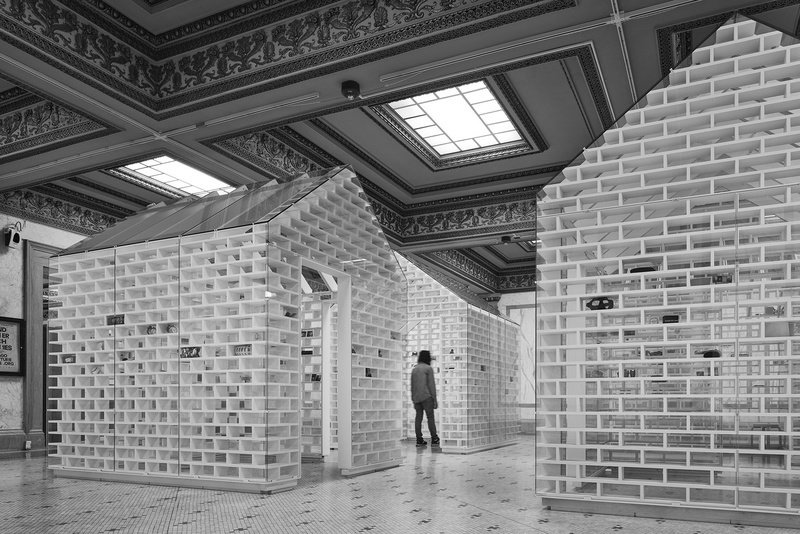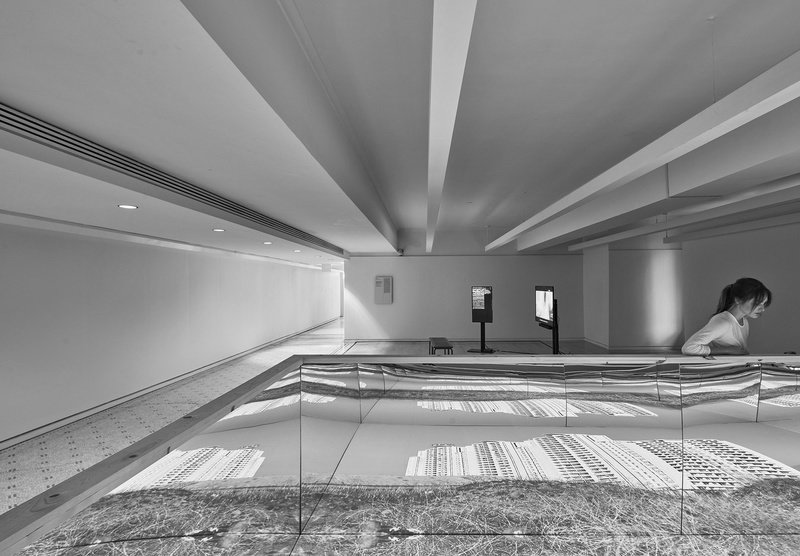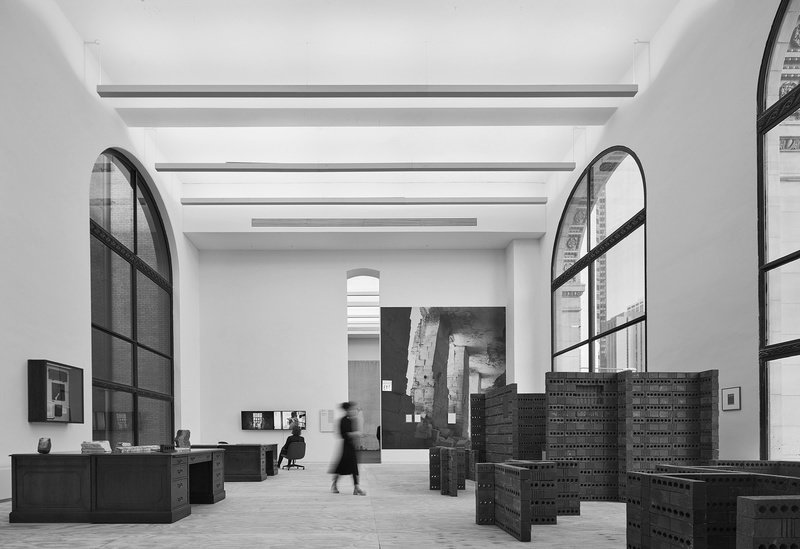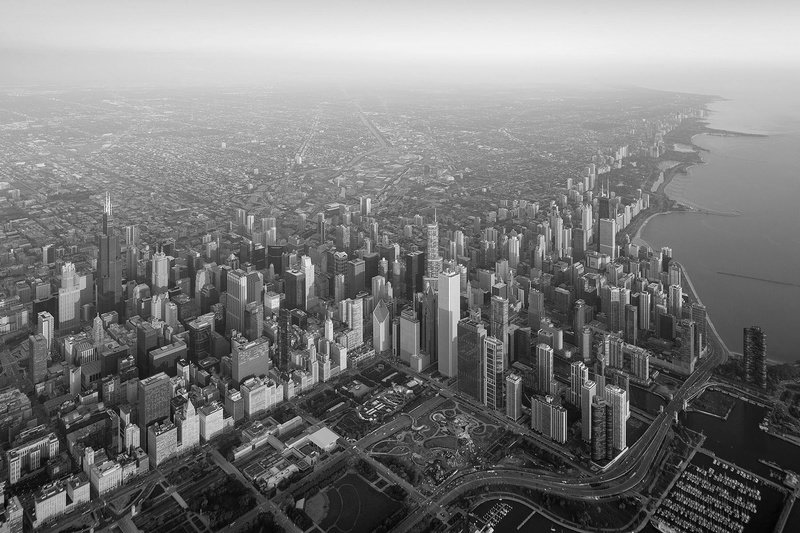The Biennial
The Chicago Architecture Biennial is a 501(c)(3) non-profit organization dedicated to creating an international forum on architecture and urbanism through the production of distinctive exhibitions and public programs. The Biennial creates new opportunities every two years for emerging talent in architecture, design, and the arts to engage a wide public audience.
Explore how architecture shapes our communities, cities and environment. The third edition of the Biennial, open 19 September 2019 – 5 January 2020, is particularly inspired by Chicago, moving beyond the grand narratives of the city’s architectural heritage to explore the history and conditions that have and continue to shape its urban development. With a broader view on the field of architecture, it embraces practices that span building, design, planning, visual art, policymaking, education, and activism.
Emanating from the central exhibition at the Chicago Cultural Center and extending into the city, the 2019 Biennial — titled ... and other such stories — features a series of new commissions, residencies, partner projects, and public programs.
Developed through a research-led approach and led by Artistic Director Yesomi Umolu with curators Sepake Angiama and Paulo Tavares, the biennial addresses the potency of space, architecture, and the natural world as they relate to four areas of inquiry: (1) No Land Beyond, which draws inspiration from indigenous approaches to nature, ecology, and landscape that transcend property ownership; (2) Appearances and Erasures, which explores both shared and contested memories in consideration of monuments, memorials, and social histories; and (3) Rights and Reclamations and (4) Common Ground, which foreground aspects of rights, advocacy, and civic purpose in architectural practice, including affordable and equitable housing.
The inaugural 2015 Chicago Architecture Biennial — presented in partnership with the City of Chicago and the Graham Foundation — was the manifestation of Mayor Rahm Emanuel’s vision for a major international architectural event and an outcome of the comprehensive cultural plan developed by the Chicago Department of Cultural Affairs and Special Events under the leadership of Michelle T. Boone. Curated by Joseph Grima and Sarah Herda (2015) and Sharon Johnston and Mark Lee (2017), the previous editions each welcomed over half a million visitors and collectively engaged over 250 leaders in architecture and art from more than 60 cities spanning 38 nations.
People
Artistic Directors
-
Yesomi Umolu
2019
-
Johnston Marklee
2017
-
Joseph Grima & Sarah Herda
2015
Board of Directors
-
Jack Guthman
Chairman
-
Ambassador Louis Susman
Director Emeritus
-
Michelle T. Boone
-
Robert Clark
-
Keating Crown
-
Valerie Corr Hanserd
-
Sarah Herda
-
Helyn Goldenberg
-
Lynn Lockwood Murphy
-
Robin Loewenberg Tebbe
-
Juan Moreno
-
Mark P. Sexton
-
Theodore Weldon
-
RaMona Westbrook
International Advisory Committee
-
David Adjaye
London
-
Wiel Arets
Chicago
-
Elizabeth Diller
New York
-
Jeanne Gang
Chicago
-
Frank Gehry
Los Angeles
-
Joseph Grima
-
Sylvia Lavin
Los Angeles
-
Lord Peter Palumbo
London
-
Zoë Ryan
Chicago
-
Martino Stierli
New York
-
Stanley Tigerman (*)
Chicago
-
Hans Ulrich Obrist
London
Staff
-
Todd Palmer
Executive Director
-
Rachel Kaplan
Deputy Director
-
Karla Aguiniga
Public Programs & Engagement Coordinator
-
Cathy Hsiao
Digital Content Coordinator
-
James Lambrix
Exhibition Coordinator
-
Tess Landon
Manager of Learning Initiatives
-
Jennifer Latshaw
Special Events Coordinator
-
Lauren McPhillips
Manager of Public Programs & Partnerships
-
Megan Moran
Learning Initiatives Coordinator
-
Therese Marie Peskowits
Exhibition Manager
-
Alex Priest
Assistant Curator
-
Christine Pundavela
Manager of Communications & Marketing
-
Cecília Resende Santos
Curatorial Fellow
-
Michael Savona
Design Coordinator
-
Unyimeabasi Udoh
Graphic Designer
-
Marguerite Wynter
Assistant Curator
Contact & Press
Chicago Architecture Biennial 78 E. Washington St. Chicago, IL 60602
info@chicagoarchitecturebiennial.org312.854.8200
For Press and Media Inquiries
Reach out to our media contacts for access to the online press kit: bit.ly/CAB_2019 US media contacts: Sara Griffin Camron PR sara.griffin@camronpr.com 917.675.4378 Helen Cowdrey Camron PR helen.cowdrey@camronpr.com 917.675.4359 Chicago/regional contact: Kimberly Writt Agency H5 kwritt@agencyH5.com 312.374.8581 International media contacts: Max Tobias Camron PR max.tobias@camronpr.com +44 (0)20 7420 1700 Hannah Perry Camron PR hannah.perry@camronpr.com +44 (0)20 7420 1700



